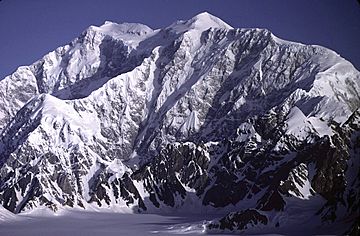Mount Logan facts for kids
Quick facts for kids Mount Logan |
|
|---|---|

Mount Logan from the southeast
|
|
| Highest point | |
| Elevation | 5,959 m (19,551 ft) |
| Prominence | 5,250 m (17,220 ft) |
| Parent peak | Mount McKinley |
| Listing | Seven Second Summits Country high point Ultra |
| Geography | |
| Location | Yukon, Canada |
| Parent range | Saint Elias Mountains |
| Topo map | NTS 115B |
| Climbing | |
| First ascent | 1925 by A.H. MacCarthy et al. |
| Easiest route | glacier/snow/ice climb |
Mount Logan is the tallest mountain in Canada. It is also the second-highest peak in North America. Only Denali (Mount McKinley) in Alaska is taller.
This amazing mountain was named after Sir William Edmond Logan. He was a famous Canadian geologist and started the Geological Survey of Canada (GSC). Mount Logan is found in Kluane National Park and Reserve in the southwestern part of Yukon.
Mount Logan is thought to have the largest base of any non-volcanic mountain on Earth. This means the area it covers at its bottom is huge! The mountain has eleven peaks that are all over 5,000 metres (16,400 ft) tall.
Extreme Weather on Mount Logan
The weather on and around Mount Logan is very cold. On the high plateau, which is about 5,000 metres (16,400 ft) up, the air temperature stays around −45 °C (−49 °F) in winter. Even in summer, it only gets close to freezing.
Because it's so cold, very little snow melts. This leads to a massive ice cap covering the mountain. In some places, this ice cap can be almost 300 m (984 ft) thick!
Exploring Mount Logan
Mount Logan is a challenging climb. The first time anyone successfully reached the top was in 1925. A team led by A.H. MacCarthy made this historic first ascent. The easiest way to climb Mount Logan involves moving over glaciers, snow, and ice.
Images for kids
See also
 In Spanish: Monte Logan para niños
In Spanish: Monte Logan para niños
 | Aurelia Browder |
 | Nannie Helen Burroughs |
 | Michelle Alexander |




